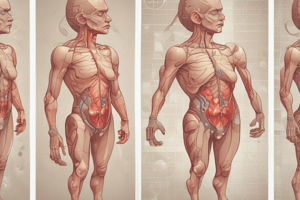Podcast
Questions and Answers
Which of the following statements accurately describes the relationship between caloric expenditure and body weight status?
Which of the following statements accurately describes the relationship between caloric expenditure and body weight status?
- Most obese individuals have a higher basal metabolic rate (BMR) than lean individuals.
- Obese individuals consistently burn less calories than lean individuals.
- Caloric expenditure is not influenced by body composition.
- During weight loss, lean individuals often burn more calories than obese individuals. (correct)
What role do adipokines play in insulin receptor sensitivity?
What role do adipokines play in insulin receptor sensitivity?
- They decrease insulin receptor sensitivity with increased NEFA levels.
- They have no effect on insulin receptor sensitivity.
- They solely act as pro-inflammatory cytokines.
- They increase insulin receptor sensitivity and promote NEFA oxidation. (correct)
Which cytokines are associated with increased insulin resistance when secreted by fat cells?
Which cytokines are associated with increased insulin resistance when secreted by fat cells?
- Adiponectin and leptin.
- AMP-K and metformin.
- Resistin and retinol-binding-protein 4.
- TNF-alpha and IL-6. (correct)
What effect do non-esterified fatty acids (NEFA) have on insulin receptor activity?
What effect do non-esterified fatty acids (NEFA) have on insulin receptor activity?
Which hormone is primarily released by the stomach during fasting and increases hunger signals?
Which hormone is primarily released by the stomach during fasting and increases hunger signals?
What is the primary outcome of visceral adipose tissue activating macrophages?
What is the primary outcome of visceral adipose tissue activating macrophages?
Which of the following is a characteristic of adipose tissue in the context of insulin resistance?
Which of the following is a characteristic of adipose tissue in the context of insulin resistance?
Which of the following accurately describes the action of AMP-K in relation to NEFA?
Which of the following accurately describes the action of AMP-K in relation to NEFA?
What is the primary consequence of the activation of DAMPs in cells?
What is the primary consequence of the activation of DAMPs in cells?
Which of the following cytokines is directly mentioned as being produced by the adipocyte?
Which of the following cytokines is directly mentioned as being produced by the adipocyte?
How does excessive lipid build-up in adipocytes contribute to systemic inflammation?
How does excessive lipid build-up in adipocytes contribute to systemic inflammation?
What is the body mass index (BMI) threshold for defining obesity?
What is the body mass index (BMI) threshold for defining obesity?
Which ratio is sometimes used to define obesity in addition to BMI?
Which ratio is sometimes used to define obesity in addition to BMI?
What component of energy expenditure is considerably larger than exercise activity thermogenesis (EAT)?
What component of energy expenditure is considerably larger than exercise activity thermogenesis (EAT)?
What detrimental effect does the production of pro-inflammatory cytokines have on the body?
What detrimental effect does the production of pro-inflammatory cytokines have on the body?
Which component of energy expenditure specifically refers to the increase in metabolic rate after food ingestion?
Which component of energy expenditure specifically refers to the increase in metabolic rate after food ingestion?
Which area of the brain is primarily associated with the reward pathway for food intake?
Which area of the brain is primarily associated with the reward pathway for food intake?
What neurotransmitter is most implicated in the hedonic model of food intake?
What neurotransmitter is most implicated in the hedonic model of food intake?
What does the hedonic pathway primarily influence regarding eating behavior?
What does the hedonic pathway primarily influence regarding eating behavior?
How do the hedonic and homeostatic pathways interact?
How do the hedonic and homeostatic pathways interact?
What common issue is suggested to be present in obese individuals concerning the hedonic model?
What common issue is suggested to be present in obese individuals concerning the hedonic model?
What hypothesis explains the behavior of individuals towards highly palatable foods?
What hypothesis explains the behavior of individuals towards highly palatable foods?
Which neurotransmitters are classified as endogenous opioids that can influence reward pathways?
Which neurotransmitters are classified as endogenous opioids that can influence reward pathways?
Which brain structure is considered the 'master integrator' of information from both hedonic and homeostatic pathways?
Which brain structure is considered the 'master integrator' of information from both hedonic and homeostatic pathways?
Which of the following is a requirement for measuring Basal Metabolic Rate (BMR)?
Which of the following is a requirement for measuring Basal Metabolic Rate (BMR)?
How does Resting Metabolic Rate (RMR) typically compare to Basal Metabolic Rate (BMR)?
How does Resting Metabolic Rate (RMR) typically compare to Basal Metabolic Rate (BMR)?
What percentage of energy expenditure (EE) does NEAT account for in sedentary individuals?
What percentage of energy expenditure (EE) does NEAT account for in sedentary individuals?
What happens to NEAT during periods of underfeeding in inactive individuals?
What happens to NEAT during periods of underfeeding in inactive individuals?
Which model suggests that increased energy expenditure in one area compensates by decreasing expenditure in another area?
Which model suggests that increased energy expenditure in one area compensates by decreasing expenditure in another area?
How do compensators react to overfeeding according to energy expenditure literature?
How do compensators react to overfeeding according to energy expenditure literature?
Which factor contributes significantly to individual variability in spontaneous physical activity (NEAT)?
Which factor contributes significantly to individual variability in spontaneous physical activity (NEAT)?
What often happens to skeletal muscles with weight loss due to caloric restriction?
What often happens to skeletal muscles with weight loss due to caloric restriction?
During what conditions is NEAT commonly assessed?
During what conditions is NEAT commonly assessed?
What percentage variation of energy expenditure can occur due to NEAT between two similar-sized individuals?
What percentage variation of energy expenditure can occur due to NEAT between two similar-sized individuals?
What role does MSH play in energy regulation when nutrients are present?
What role does MSH play in energy regulation when nutrients are present?
What is the primary effect of AGRP neurons when nutrients are present?
What is the primary effect of AGRP neurons when nutrients are present?
How does increased serotonin signaling affect AGRP neurons?
How does increased serotonin signaling affect AGRP neurons?
Which mechanism is involved in the satiety effect mediated by MSH signaling?
Which mechanism is involved in the satiety effect mediated by MSH signaling?
What effect does the 5-HTc receptor agonist Lorcaserin have on weight?
What effect does the 5-HTc receptor agonist Lorcaserin have on weight?
Which brain region is primarily involved in integrating peripheral and central signals related to energy regulation?
Which brain region is primarily involved in integrating peripheral and central signals related to energy regulation?
What happens to AGRP neurons in response to nutrient availability?
What happens to AGRP neurons in response to nutrient availability?
What complication arises from the signaling mechanisms of serotonin in relation to weight regulation?
What complication arises from the signaling mechanisms of serotonin in relation to weight regulation?
What is the single most important environmental risk factor for insulin resistance?
What is the single most important environmental risk factor for insulin resistance?
Which statement accurately reflects the association between caloric intake and body weight in obese individuals?
Which statement accurately reflects the association between caloric intake and body weight in obese individuals?
What is the relationship between genetic factors and body weight variance in the population?
What is the relationship between genetic factors and body weight variance in the population?
What is the role of impaired satiety mechanisms observed in obese individuals?
What is the role of impaired satiety mechanisms observed in obese individuals?
What aspect of exercise is recognized as a separate risk factor influencing obesity?
What aspect of exercise is recognized as a separate risk factor influencing obesity?
What is a possible explanation for why obese individuals experience increased eating behavior despite impaired reward pathway activation?
What is a possible explanation for why obese individuals experience increased eating behavior despite impaired reward pathway activation?
What is the primary function of MSH in the context of nutrient presence?
What is the primary function of MSH in the context of nutrient presence?
Which type of adipose tissue is predominantly associated with triglyceride storage and plays an important endocrine role?
Which type of adipose tissue is predominantly associated with triglyceride storage and plays an important endocrine role?
Which peripheral signal is known for its orexigenic effect and is secreted from the stomach?
Which peripheral signal is known for its orexigenic effect and is secreted from the stomach?
Which statement accurately reflects the role of AGRP neurons when nutrients are available?
Which statement accurately reflects the role of AGRP neurons when nutrients are available?
What mechanism allows brown fat to contribute to thermogenesis without producing ATP?
What mechanism allows brown fat to contribute to thermogenesis without producing ATP?
Which neurotransmitter's signaling is crucial for activating MSH neurons as per the content provided?
Which neurotransmitter's signaling is crucial for activating MSH neurons as per the content provided?
How do peripheral signals interact with the central nervous system in regulating energy balance?
How do peripheral signals interact with the central nervous system in regulating energy balance?
What effect does the 5-HTc receptor agonist Lorcaserin have on obese individuals?
What effect does the 5-HTc receptor agonist Lorcaserin have on obese individuals?
How does the inhibition of AGRP neurons contribute to satiety signaling?
How does the inhibition of AGRP neurons contribute to satiety signaling?
What evidence suggests that lean subjects have an advantage over obese subjects in terms of reward pathway activation?
What evidence suggests that lean subjects have an advantage over obese subjects in terms of reward pathway activation?
What role does the hypothalamus play in the homeostatic system involving peripheral signals?
What role does the hypothalamus play in the homeostatic system involving peripheral signals?
What mechanism is described as mediating satiety through MSH signaling?
What mechanism is described as mediating satiety through MSH signaling?
What impact does visually palatable food stimuli have on those who are obese compared to lean subjects?
What impact does visually palatable food stimuli have on those who are obese compared to lean subjects?
What is the role of serotonergic neurons located in the midbrain regarding energy regulation?
What is the role of serotonergic neurons located in the midbrain regarding energy regulation?
What is the consequence of increased MSH signaling in the presence of nutrients?
What is the consequence of increased MSH signaling in the presence of nutrients?
What is the primary effect of excessive lipid build-up in adipocytes on pro-inflammatory cytokine production?
What is the primary effect of excessive lipid build-up in adipocytes on pro-inflammatory cytokine production?
Which mechanism is primarily responsible for the development of insulin resistance related to pro-inflammatory cytokines?
Which mechanism is primarily responsible for the development of insulin resistance related to pro-inflammatory cytokines?
What is a potential role of free fatty acids in high concentrations within adipocytes?
What is a potential role of free fatty acids in high concentrations within adipocytes?
How does the ratio of waist to hip measurements contribute to the assessment of obesity?
How does the ratio of waist to hip measurements contribute to the assessment of obesity?
Which component of energy expenditure accounts for the largest part of an individual's daily energy needs?
Which component of energy expenditure accounts for the largest part of an individual's daily energy needs?
What is the potential consequence of chronic activation of DAMPs in cells?
What is the potential consequence of chronic activation of DAMPs in cells?
Which statement best describes the relationship between insulin resistance and type II diabetes?
Which statement best describes the relationship between insulin resistance and type II diabetes?
What role does non-exercise activity thermogenesis (NEAT) play in overall energy expenditure?
What role does non-exercise activity thermogenesis (NEAT) play in overall energy expenditure?
Which statement best explains how increased gut permeability in obesity influences insulin sensitivity?
Which statement best explains how increased gut permeability in obesity influences insulin sensitivity?
What role do short-chain fatty acids (SCFAs) play in regulating food intake?
What role do short-chain fatty acids (SCFAs) play in regulating food intake?
In which manner does vagotomy impact body weight regulation?
In which manner does vagotomy impact body weight regulation?
How do Bifidobacterium and Lactobacillus impact hunger and satiety hormones?
How do Bifidobacterium and Lactobacillus impact hunger and satiety hormones?
Why have intervention studies on SCFAs shown limited benefits on weight management in metabolic syndrome?
Why have intervention studies on SCFAs shown limited benefits on weight management in metabolic syndrome?
Flashcards are hidden until you start studying
Study Notes
Regulation of Body Weight and Appetite
- Obese individuals can have a higher overall calorie usage than lean individuals but may burn fewer calories during weight loss.
- Basal metabolic rate (BMR) varies; many obese people exhibit a reduced BMR.
Satiety and Hunger Signals
- Key satiety hormones:
- Leptin, GLP-1, CCK, PYY, and vagal afferents.
- Hunger hormone:
- Ghrelin, released during fasting.
Insulin Resistance and Visceral Fat
- Non-esterified fatty acids (NEFA) are linked to increased insulin resistance, especially from central fat stores.
- Adipokines, protein hormones from fat cells, can enhance insulin receptor sensitivity.
- Pro-inflammatory cytokines from adipose tissue can impair insulin receptor function.
Visceral Obesity and Inflammation
- Visceral fat can recruit macrophages, producing pro-inflammatory cytokines such as TNF-alpha and IL-6.
- Increased IL-6 levels lead to systemic inflammation and increased CRP production by the liver.
- Insulin resistance in visceral fat elevates free fatty acids and further stimulates pro-inflammatory pathways.
Definitions of Obesity
- Overweight is defined as BMI ≥ 25 kg/m², while obesity is BMI ≥ 30 kg/m².
- Waist-to-hip ratios also classify obesity risk differently for men (>0.90) and women (>0.85).
Energy Expenditure Components
- Total energy expenditure comprises resting metabolic rate (RMR), activity-related energy expenditure (AEE), and diet-induced thermogenesis (DIT).
- Basal metabolic rate (BMR) is measured under strict conditions; RMR is slightly more variable depending on daily activities.
Non-Exercise Activity Thermogenesis (NEAT)
- NEAT represents spontaneous physical activities not categorized as deliberate exercise and can vary significantly among individuals.
- NEAT can account for 6-10% of energy expenditure in sedentary lifestyles, increasing to 50% in highly active individuals.
Dietary Impact on NEAT
- Overfeeding may increase NEAT in some, but most do not compensate calorically through increased activity.
- Underfeeding results in decreased RMR and NEAT, particularly in inactive individuals.
Energy Expenditure Models
- The independent model suggests that increases in NEAT and EAT lead to higher total energy expenditure.
- The compensation model indicates increased expenditure in one area may reduce expenditure in another.
- Genetic factors significantly influence spontaneous physical activity levels.
Insulin Resistance and Exercise
- Weight loss from caloric restriction may enhance muscle efficiency, impacting metabolic markers.
- The CNS plays a significant role in energy regulation through various hypothalamic signals.
Serotonin and Energy Regulation
- Serotonin influences satiety by activating MSH neurons that inhibit food intake-promoting neurons.
- Lorcaserin, a 5-HTc receptor agonist, has been shown to induce weight loss.
Hedonic Pathway in Food Intake
- Food intake is driven by reward pathways, with decreased focus on nutrient availability.
- Key brain areas involved include the lateral hypothalamus and nucleus accumbens, regulated by neurotransmitters like dopamine.
Interaction of Hedonic and Homeostatic Pathways
- Hedonic and homeostatic pathways are interrelated; each can influence the other regarding energy regulation.
- Hypothalamus acts as a master integrator, balancing signals from both pathways to dictate eating behavior.
Reward Deficiency Hypothesis
- People may experience less satisfaction from food due to a deficit in the brain's reward system, leading to increased food consumption.
Pathogenesis of Obesity
-
Insulin Resistance & Obesity:
- Obesity is the main environmental risk factor for insulin resistance.
- Central obesity is particularly crucial, while lack of exercise is an additional risk factor.
- Most insulin resistance cases arise from a mix of genetic and environmental factors.
- Type 2 Diabetes Mellitus (T2DM) is highly heritable, with genetic causes accounting for about 5% of body weight variance.
-
Obesity Misconceptions:
- Obese individuals do not always consume more calories; reporting biases can skew results.
- Poorly characterized leptin resistance may impair satiety mechanisms in obese individuals.
- Activation of DAMPs (Damage Associated Molecular Patterns) and increased pro-inflammatory cytokines contribute to insulin resistance.
-
Chronic Inflammation Effects:
- Excessive lipid accumulation in adipocytes leads to oxidative stress (ROS) and produces inflammatory cytokines like IL-6 and TNF-alpha.
- These cytokines create a feedback loop that exacerbates insulin resistance and may trigger type II diabetes.
Definitions of Overweight and Obesity
-
BMI Metrics:
- Overweight is defined as BMI ≥ 25 kg/m²; obesity is defined as BMI ≥ 30 kg/m².
- Waist-to-hip ratios are also used to assess obesity: men > 0.90, women > 0.85.
-
Energy Expenditure (EE) Components:
- Total energy expenditure includes:
- Resting Metabolic Rate (RMR): energy at rest.
- Activity-Related Energy Expenditure (AEE): encompasses both Exercise Activity Thermogenesis (EAT) and Non-Exercise Activity Thermogenesis (NEAT).
- Diet-Induced Thermogenesis (DIT): metabolic rate increase during digestion.
- Total energy expenditure includes:
Homeostatic Regulation of Energy Intake
-
Central Nervous System (CNS) Role:
- The arcuate nucleus and paraventricular nucleus in the hypothalamus regulate hunger and energy expenditure.
- MSH release from POMC neurons promotes satiety, while AGRP neurons inhibit it.
-
Serotonin and Eating Behavior:
- Serotonin signaling increases satiety via MSH activation and AGRP inhibition.
- Lorcaserin, a 5-HTc receptor agonist, can promote weight loss in obese individuals.
Peripheral Players in Energy Regulation
-
Key Hormones and Signals:
- Adipose tissue produces leptin, adiponectin, and resistin, influencing hunger and metabolism.
- The gastrointestinal tract secretes hormones like ghrelin (hunger stimulant), GLP-1, and CCK (satiety hormones).
- The pancreas releases insulin, which plays a critical role in energy homeostasis.
-
Hypothalamic Interaction:
- The hypothalamus’s environment allows peripheral signals to influence appetite regulation.
- The vagus nerve transmits signals from the gut to the hypothalamus, assisting in energy balance.
Types of Adipose Tissue
-
White and Brown Fat Differences:
- White fat is the main form of adipose tissue, storing triglycerides and performing endocrine functions.
- Brown fat, mainly present in infants, is involved in thermogenesis and decreases with age.
- Mechanisms of fat burning include uncoupling proteins in mitochondria allowing fat oxidation without ATP production.
-
Gut Microbiota Influence:
- Obesity correlates with gut microbiota changes leading to increased permeability and systemic inflammation, contributing to insulin insensitivity.
- High-fat meals increase plasma LPS in obese individuals compared to lean counterparts.
Gut Microbiota's Impact on Food Intake
- Role of Short-Chain Fatty Acids (SCFAs):
- SCFAs influence satiety by increasing PYY and GLP-1 secretion, stimulating the vagus nerve, and promoting leptin production.
- However, interventions with SCFA supplements have not demonstrated consistent weight loss benefits in metabolic syndrome.
- Specific gut bacteria like Bifidobacterium and Lactobacillus correlate positively with leptin and negatively with ghrelin, impacting hunger regulation.
Studying That Suits You
Use AI to generate personalized quizzes and flashcards to suit your learning preferences.




